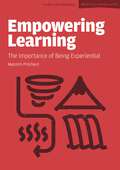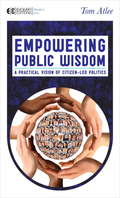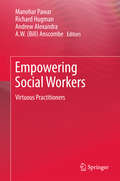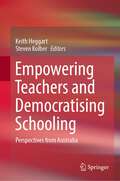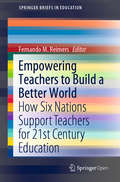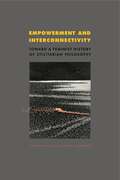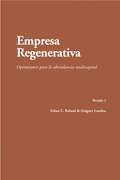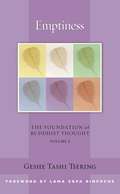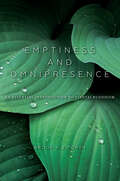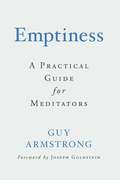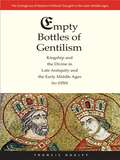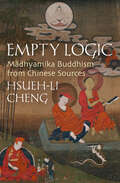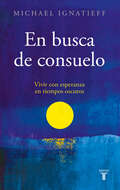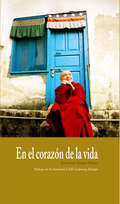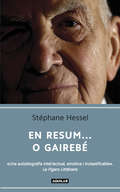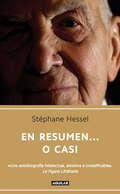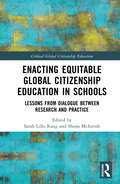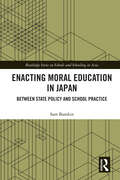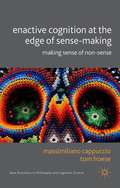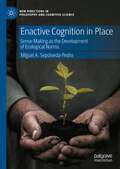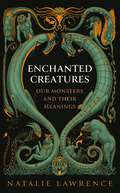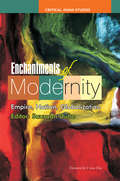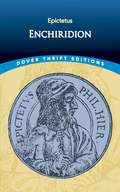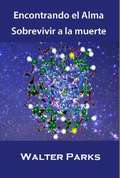- Table View
- List View
Empowering Learning: The Importance Of Being Experiential (World Class Schools)
by Dr Malcolm Pritchard Malcolm PritchardExperience - it is our first teacher in life, our early warning system, and our guide to world discovery. Experience connects the inner self to the outer world. It shapes our thoughts, informs our attitudes, motivates our actions. It is the most common mode of learning for all of humanity. Yet, hidden in plain sight, experiential learning is largely taken for granted by educators and researchers. We assume that experience is largely educational. We simply 'learn by doing' - don't we? There is a world of difference between 'doing' and 'doing intelligently'. By understanding how experience acts as a mechanism to inspire and scaffold memorable learning, we stand to gain greater control over this most powerful and universal force in human development. Learning, empowered by experience, is life-changing for learners; experience, purposefully harnessed, is transformational for schools.
Empowering Public Wisdom
by Tom AtleeLifelong activist Tom Atlee proposes innovative ways to distill the wisdom of ordinary people in order to better guide public policy. In Empowering Public Wisdom, Atlee recognizes currently popular forms of progressive democracy advocates, such as citizen participation and voter education, but suggests that what is really needed is a re-thinking of the very concept of democracy; Atlee advocates the use of "public wisdom," a collective intelligence that can be drawn upon to guide public policy and action. Reaching beyond partisan politics, Atlee explores how a diversity of views can be engaged around public issues in ways that generate a coherent, shared "voice of the people" that takes most or all of the population's perspectives and needs into account. Atlee's core approach is through "citizen deliberative councils," in which a small group of people randomly selected creates a "mini-public" or a microcosm of the larger population. Citizen councils engage in the study of a public issue and make recommendations to public officials and the community, but disband afterward; when a new issue arises, a new council is formed. Ultimately, Atlee aims even higher, suggesting a possible fourth branch of government to better balance our current democratic system. Combining a radical vision with practical solutions, Empowering Public Wisdom provides a unique and refreshing voice in the political arena.Empowering Public Wisdom is part of the EVOLVER EDITIONS Manifesto Series.From the Trade Paperback edition. on co-intelligence holds some of the keys to enabling us to work with the ever-more complex opportunities in human existence." -- Robert Theobald, author of Turning the Century and The Rapids of Change"Tom Atlee is a unique soul who is fostering the awakening of our collective wisdom."-- Duane Elgin, author of Voluntary Simplicity and Promise Ahead"Tom Atlee's work is an important contribution to the world I want to create." -- Stewart Levine, Esq, author of Getting to Resolution and The Book of Agreement
Empowering Social Workers
by Andrew Alexandra Manohar Pawar A. W. Bill Anscombe Richard HugmanThis book demonstrates the central role of ethical character in effective social work practice. Showcasing select biographies of social workers, it reveals how skilled practitioners have developed such core virtues as compassion, love, commitment, prudence, respect for human dignity and a critical sense of social justice through the course of their working lives, and how they apply these virtues in a wide variety of settings and situations to enhance the well-being of the people and communities they work with. As such, the book offers a powerful and inspiring resource to help educators, students and practitioners understand the unbreakable link between what social workers and other social welfare and social development professionals do and who they are, and thereby cultivate core qualities that should be promoted. "Pawar, Hugman, Alexandra and Anscombe have found a novel and creative way to explore virtues in social work by examining the career contributions of a group of social work practitioners engaged in 'virtuous action'. Their stories are inspiring and they provide much-needed role models for students and practitioners embarking on empowering practice" - Dr. Mel Gray, Professor of Social Work, The University of Newcastle. New South Wales, Australia. "In an age where the virtues of truth, cooperation and "doing the right thing" are increasingly being eroded in public life, this book serves as both an inspiration and invaluable resource to all social work practitioners seeking to reflect on, and improve their practice" - Dr. Martin Ryan, Social Worker, Counsellor/Community Educator, Jesuit Social Services, Melbourne. "The editors are to be commended for examining the virtuous characters of these ten professional social workers. The use of detailed biographies is an innovative and important approach which helps us to appreciate just what a tremendous impact the virtues can have. " - Dr. Christian B. Miller, A. C. Reid Professor of Philosophy, Director, The Character Project, Wake Forest University, USA.
Empowering Teachers and Democratising Schooling: Perspectives from Australia
by Keith Heggart Steven KolberThis edited book brings together teachers and education academics who are committed to education about, for and through democracy. It presents a diverse range of viewpoints about the challenges facing educators working across different sectors and discusses ways to challenge issues like neoliberalism, excessive managerialism and accountability and privatisation. It also engages with the times that education has, and continues, to fail students. This book outlines both logistical and ideological challenges which educators committed to democracy face and describes innovative approaches they have adopted, including networking, the use of social media and digital tools and extending their reach beyond their local communities to international audiences. It encourages conversations about how educators and academics might re-commit to education for democracy and generate further avenues for discussion and action by educators and academics.
Empowering Teachers to Build a Better World: How Six Nations Support Teachers for 21st Century Education (SpringerBriefs in Education)
by Fernando M. ReimersThis open access book presents a comparative study on how large-scale professional development programs for teachers are designed and implemented. Around the world, governments and educators are recognizing the need to educate students in a broad range of higher order cognitive skills and socio-emotional competencies, and providing effective opportunities for teachers to develop the expertise needed to teach these skills is a crucial aspect of effective implementation of curricula which include those goals. This study examines how large-scale efforts to empower teachers for deeper instruction have been designed, how they have been implemented, and their outcomes. To do so, it investigates six programs from England, Colombia, Mexico, India, and the United States. Though all six are intended to broaden and deepen students’ curricular aspirations, each takes this expansion of curricular goals in a different direction.The ambitious education reforms studied here explicitly focus on building teachers’ capacity to teach on a broader set of goals. Through a discerning analysis of program documents, evaluations, and interviews with senior leaders and participants in the programs, the book identifies the various theories of action used in these programs, examines how they were implemented, and discusses what they achieved. As such, it offers an indispensable resource for education leaders interested in designing and implementing professional development programs for teachers that are aligned with ambitious instructional goals.
Empowerment and Interconnectivity: Toward a Feminist History of Utilitarian Philosophy
by Catherine Villanueva GardnerFeminist history of philosophy has successfully focused thus far on canon revision, canon critique, and the recovery of neglected or forgotten women philosophers. However, the methodology remains underexplored, and it seems timely to ask larger questions about how the history of philosophy is to be done and whether there is, or needs to be, a specifically feminist approach to the history of philosophy. In Empowerment and Interconnectivity, Catherine Gardner examines the philosophy of three neglected women philosophers, Catharine Beecher, Frances Wright, and Anna Doyle Wheeler, all of whom were British or American utilitarian philosophers of one stripe or another. Gardner’s focus in this book is less on accounting for the neglect or disappearance of these women philosophers and more on those methodological (or epistemological) questions we need to ask in order to recover their philosophy and categorize it as feminist.
Empowerment and Interconnectivity: Toward a Feminist History of Utilitarian Philosophy
by Catherine Villanueva GardnerFeminist history of philosophy has successfully focused thus far on canon revision, canon critique, and the recovery of neglected or forgotten women philosophers. However, the methodology remains underexplored, and it seems timely to ask larger questions about how the history of philosophy is to be done and whether there is, or needs to be, a specifically feminist approach to the history of philosophy. In Empowerment and Interconnectivity, Catherine Gardner examines the philosophy of three neglected women philosophers, Catharine Beecher, Frances Wright, and Anna Doyle Wheeler, all of whom were British or American utilitarian philosophers of one stripe or another. Gardner’s focus in this book is less on accounting for the neglect or disappearance of these women philosophers and more on those methodological (or epistemological) questions we need to ask in order to recover their philosophy and categorize it as feminist.
Empresa regenerativa. Optimizarse para la abundancia multicapital
by Ethan Roland Gregory Landua Noelia JiménezYa no es aceptable generar beneficios económicos extrayendo la riqueza viva fundamental de nuestras tierras y aguas. Las empresas necesitan un nuevo modelo con el que interpretar el mundo y un nuevo proceso para el diseño de sistemas integrales y la toma de decisiones. 8 formas de capital es ese modelo. Al articular las múltiples formas de capital con las que realizamos transacciones cada día, se abre la puerta a un enfoque evolutivo de la economía y los beneficios. Nuestro nuevo libro Empresa regenerativa define la diferencia entre los sistemas degenerativos, sostenibles y regenerativos y articula los cuatro factores de una empresa regenerativa así como los principios para diseñar ecologías de empresas regenerativas.
Emptiness
by Lama Thubten Zopa Rinpoche Geshe Tashi Tsering Gordon McdougallIn Emptiness, the fifth volume in The Foundation of Buddhist Thought series, Geshe Tashi Tsering provides readers with an incredibly welcoming presentation of the central philosophical teaching of Mahayana Buddhism. Emptiness does not imply a nihilistic worldview, but rather the idea that a permanent entity does not exist in any single phenomenon or being. Everything exists interdependently within an immeasurable quantity of causes and conditions. An understanding of emptiness allows us to see the world as a realm of infinite possibility, instead of a static system. Just like a table consists of wooden parts, and the wood is from a tree, and the tree depends on air, water, and soil, so is the world filled with a wondrous interdependence that extends to our own mind and awareness. In lucid, accessible language, Geshe Tashi Tsering guides the reader to a genuine understanding of this infinite possibility.
Emptiness and Omnipresence: An Essential Introduction to Tiantai Buddhism (World Philosophies Ser.)
by Brook A. ZiporynTiantai Buddhism emerged from an idiosyncratic and innovative interpretation of the Lotus Sutra to become one of the most complete, systematic, and influential schools of philosophical thought developed in East Asia. Brook A. Ziporyn puts Tiantai into dialogue with modern philosophical concerns to draw out its implications for ethics, epistemology, and metaphysics. Ziporyn explains Tiantai's unlikely roots, its positions of extreme affirmation and rejection, its religious skepticism and embrace of religious myth, and its view of human consciousness. Ziporyn reveals the profound insights of Tiantai Buddhism while stimulating philosophical reflection on its unexpected effects.
Emptiness: A Practical Guide for Meditators
by Joseph Goldstein Guy ArmstrongIf everything is empty, then what ceases in Nirvana and is born in rebirth? How can you live in the world without feeling trapped by it? Guy Armstrong tackles these questions and more in this richly informed, practical guide to emptiness for the meditator.It may seem odd for emptiness to serve as the central philosophy of a major religion. In fact, emptiness points to something quite different than “nothingness” or “vacancy.” And by developing a richer understanding of this complex topic, we can experience freedom as we live consciously in the world. Guy Armstrong has been a leading figure and beloved teacher of insight meditation for decades. In this book, he makes difficult Buddhist topics easy to understand, weaving together Theravada and Mahayana teachings on emptiness to show how we can liberate our minds and manifest compassion in our lives.
Empty Bottles of Gentilism
by Francis OakleyIn this book--the first volume in his groundbreaking trilogy on the emergence of western political thought--Francis Oakley explores the roots of secular political thinking by examining the political ideology and institutions of Hellenistic and late Roman antiquity and of the early European middle ages. By challenging the popular belief that the ancient Greek and Roman worlds provided the origins of our inherently secular politics, Oakley revises our understanding of the history of political theory in a fundamental and far-reaching manner that will reverberate for decades. This book lays the foundations for Oakley's next two volumes, which will develop his argument that it is in the Latin middle ages that we must seek the ideological roots of modern political secularism.
Empty Logic: Madhyamika Buddhism from Chinese Sources
by Hsueh-li Cheng&“Covers the basic philosophy and arguments of Mādhyamika, as well as discussing its possible influence on other forms of Buddhist thought, including Zen.&”—Journal of Chinese Philosophy The chief purpose of Empty Logic is to expound the Mādhyamika philosophy of emptiness as presented in Chinese sources and to clarify misconceptions about this important Buddhist ideology. It is an attempt to present the earlier Chinese San-lun exposition of Nāgārjuna&’s thought. To followers of Mādhyamika, the doctrine of emptiness is not a metaphysical theory; rather it is essentially a way of salvation. Few people know that one of the most significant outcomes of Nāgārjuna&’s teaching was the creation of Zen (Ch&’an) Buddhism in China. In this work, Hsueh-li Cheng provides a general background of Buddhism to give a historical perspective of Mādhyamika thought and development. After exploring the various meanings and use of emptiness in the process of salvation and illustrating the relationship between Mādhyamika and Zen, Cheng investigates how Mādhyamikas addresses the concepts of reality, God, and knowledge. There follows a brief comparison between Nāgārjuna&’s, Kant&’s, and Wittgenstein&’s philosophies to suggest the unique nature of Nāgārjuna&’s teaching and explain why his beliefs cannot be classified alongside the other two thinkers. Teaching emptiness as the middle way, the revolutionary Mādhyamika branch of Buddhism offers a singular and fascinating path to achieving liberation from the evil and suffering of the world.
En busca de consuelo: Vivir con esperanza en tiempos oscuros
by Michael IgnatieffUn libro luminoso y reconfortante sobre cómo los grandes filósofos y artistas recuperaron las ganas de vivir tras afrontar grandes crisis. Nos blinda contra el desaliento. «Ignatieff nosrecuerda que no somos la primera generación que se enfrenta a la desesperación y busca caminos para salir de ella». The Guardian Cuando la vida parece perder su sentido, necesitamos palabras. Cuando sufrimos un duelo, una traición, la soledad o una derrota, buscamos ayuda para recuperar ese sentido. El lenguaje del consuelo fue antaño el gran objeto de estudio de religiosos y filósofos, pero se ha ido desvaneciendo de nuestro vocabulario moderno. Desde el siglo XVI, la humanidad ha tendido a rechazar el alivio proveniente de los textos sagrados para, en su lugar, concentrar su fe en la ciencia, las ideologías y las terapias. Además, como advierte el gran pensador e historiador Michael Ignatieff, «hoy el premio de consolación es el que nadie quiere ganar. Las culturas que persiguen el éxito no prestan mucha atención al fracaso, la pérdida o la muerte. La consolación es para los perdedores». Ignatieff explora con brillantez y de forma conmovedora el modo en que una serie de filósofos, escritores, artistas y músicos como Dante Alighieri, Albert Camus, Anna Ajmátova, Gustav Mahler o Primo Levi recobraron la esperanza tras momentos de desamparo. A menudo encuentra las claves donde menos lo esperaríamos: en el fracaso del estoicismo de Cicerón, en las noches de insomnio de Marco Aurelio, en las ilusiones rotas de Karl y Jenny Marx, recreando las situaciones en que estas grandes figuras encontraron el coraje, la fortaleza, la fuerza intelectual y la imaginación necesarios para hacer frente a su destino. En busca de consuelo muestra lo que esas historias pueden enseñarnos a la hora de afrontar las angustias e incertidumbres del presente. La crítica ha dicho:«Seguir a Michael Ignatieff en su búsqueda de momentos de consuelo en la historia es iluminador, conmovedor y reconfortante, todo a la vez».Stephen Greenblatt, autor de El giro «La lectura de estos memorables retratos de figuras históricas que necesitaron, buscaron, perdieron el consuelo o lo encontraron deja al lector bien concienciado de los profundos retos y posibilidades que la vida nos plantea».Mark Lilla«Este ensayo erudito y sincero nos recuerda que la necesidad de consuelo es intemporal, como lo son las palabras inspiradoras y los ejemplos de quienes recorrieron el camino de la vida antes que nosotros».Toronto Star «Ignatieff rastrea lo que pueden enseñarnos los grandes pensadores sobre cómo aferrarse a la esperanza y seguir creyendo en la vida. Este libro importante defiende que lo que nos consuela no son las doctrinas, sino las personas».The Irish Times«Una inspiración para los que necesitan palabras para seguir con su vida».Kirkus Reviews «Imprescindible. Ignatieff quiere que los modernos conozcamos las viejas costumbres que hemos dejado atrás, y recordarnos que algunos problemas están, por su naturaleza, más allá de los poderes de la tecnología y del buen gobierno».Air Mail
En el corazón de la vida
by Pedro Pablo Menéndez Jetsunma Tenzin Palmo Zuanilda Mendoza Itzel García Patricio Ortiz Alejandro García Alberto Fournier Diana Luz Sánchez Lilian Sussman Raquel Cajiga Elisa Caño S.S Gyalwang Drukpa Leticia GómezJetsunma Tenzin Palmo nos ofrece en este libro una comprensión profunda del Dharma, obtenida a lo largo de cuarenta años de compromiso con la práctica budista. Su perspectiva es vasta, con un entendimiento bien cimentado de cómo las enseñanzas atemporales de Buda se aplican a las exigencias y retos de la vida contemporánea. En el corazón de la vida está dirigido al público en general y presenta consejos prácticos que pueden ser aplicados seamos o no budistas, a partir de reflexiones sobre cómo enriquecer nuestras vidas y desarrollar amor, compasión y sabiduría.
En resum ... o gairebé
by Stéphane Hessel«Una autobiografia intel·lectual, emotiva i inclassificable.» Le Figaro Littéraire «Aquesta acumulació de memòria humana constitueix un tresor de sentit. Haver travessat un segle ple d'invents, esperances i horrors, i haver viscut plenament aquesta aventura és el que em dóna legitimitat. Perquè potser he rebut de la vida un deute de sentit, i avui em puc permetre pagar-lo amb el meu testimoni.»Stéphane Hessel A En resum... o gairebé l'agitador de consciències Stéphane Hessel aborda de manera magistral els temes de la indignació i els seus límits, la compassió, l'amor, l'admiració, la resiliència, la reivindicació de la dignitat, la força de les paraules, el compromís polític o la democràcia per transmetre a les noves generacions que cal lluitar dia a dia per recuperar la dignitat i per construir les bases d'un futur comú més just i accessible per a tothom. Una obra reveladora i necessària en la qual la veu de Hessel es barreja amb versos i confidències, amb opinions i records que configuren la trajectòria intel·lectual i personal d'un home bo. Opinions:«Les paraules de Stéphane Hessel desborden el marc d'un simple llibre. Són una crida a obrir els ulls i despertar les nostres consciències. Aquest llibre, per tant, no és una autobiografia en sentit estricte, no mira cap al passat. És una invitació a tenir valor. Recull unes experiències que han resultat exemplars i útils per fer costat a un compromís, a una manera d'enfrontar-se a la vida.»Maren Sell (editor francès)
En resumen... o casi
by Stéphane HesselUn compendio de experiencias ejemplares para respaldar un compromiso, una manera de enfrentar la vida. «Esta acumulación de memoria humana constituye un tesoro de sentido. Haber atravesado un siglo lleno de inventos, esperanzas y horrores, y haber vivido plenamente esta aventura es lo que me da legitimidad. Porque tal vez he recibido de la vida una deuda de sentido, y hoy puedo permitirme pagarla con mi testimonio.»Stéphane Hessel En En resumen... o casi el agitador de conciencias Stéphane Hessel aborda de forma magistral los temas de la indignación y sus límites, la compasión, el amor, la admiración, la resiliencia, la reivindicación de la dignidad, la fuerza de las palabras, el compromiso político o la democracia para transmitir a las nuevas generaciones que es preciso luchar a diario por recuperar la dignidad y por construir las bases de un futuro común más justo y accesible para todos. Una obra reveladora y necesaria en la que la voz de Hessel se entremezcla con versos y confidencias, con opiniones y recuerdos que configuran la trayectoria intelectual y personal de un hombre bueno. Reseñas:«Una autobiografía intelectual, emotiva e inclasificable.»Le Figaro Litteraire «Las palabras de Stéphane Hessel desbordan el marco de un simple libro. Son una llamada a abrir los ojos y despertar nuestras conciencias. Este libro, por tanto, no es una autobiografía en sentido estricto, no mira hacia el pasado. Es una invitación a tener valor. Recoge unas experiencias que han resultado ejemplares y útiles para respaldar un compromiso, una manera de enfrentarse a la vida.»Maren Sell (editor francés)
Enacting Equitable Global Citizenship Education in Schools: Lessons from Dialogue between Research and Practice (Critical Global Citizenship Education)
by Sarah Lillo Kang Shona McIntoshOffering contributions and vignettes from teachers, school leaders, and scholars, this volume purposefully dismantles practitioner-academic divides to invite dialogue around diverse understandings of global citizenship education (GCE). Recognizing that the field of GCE is often explored and conceptualized by educators and academics in silos, this book confronts this issue by focusing on how schools, educators, and researchers can together support the enactment of GCE in international and national settings. In doing so, issues of westernization, inequality, access, and divergence between GCE policy and practical implementation can be overcome. The novel dialogical format links together theory, practice, and lived experience to create discourses between voices that are rarely connected. Ultimately, this volume offers important insights for those aiming to make equitable GCE a reality in schools worldwide and illustrates the value of collaborative dialogic exchange. This text will benefit scholars, academics, and students in the fields of international and comparative education, the sociology of education, and citizenship more broadly. Those involved with multicultural education policy and citizenship in the context of political sociology and social policy will also benefit from this volume.
Enacting Moral Education in Japan: Between State Policy and School Practice (Routledge Series on Schools and Schooling in Asia)
by Sam BamkinDrawing on the case of moral education reform, this book provides an authoritative picture of how policy is enacted between state policymaking and school practice in Japan, focusing on how national policy is enacted locally in the classroom. The study follows the 2015 moral education reform from its genesis in central government, through the Ministry of Education to its enactment by local government and schools. The book looks beyond written policies, curricula and textbooks to examine how teachers, school administrators and others make sense of, and translate, policy into practice in the Japanese classroom context. Chapters explore how moral education practice has changed in response to the intentions of national policy, and analyzes the implications for understanding processes of policy enactment in the Japanese education system. This book presents a new perspective on the complexity of education policy making, practice, and the gaps in between. It will be of interest to postgraduate students, researchers, and academics in the fields of education policy and politics, moral education, school administration, and international and comparative education more broadly, particularly in Asia.
Enactive Cognition At The Edge Of Sense-making
by Massimiliano Cappuccio Tom FroeseThe enactive approach replaces the classical computer metaphor of mind with emphasis on embodiment and social interaction as the sources of our goals and concerns. Researchers from a range of disciplines unite to address the challenge of how to account for the more uniquely human aspects of cognition, including the abstract and the nonsensical.
Enactive Cognition in Place: Sense-Making as the Development of Ecological Norms (New Directions in Philosophy and Cognitive Science)
by Miguel A. Sepúlveda-PedroThis book aims to enrich our understanding of the role the environment plays in processes of life and cognition, from the perspective of enactive cognitive science. Miguel A. Sepúlveda-Pedro offers an unprecedented interpretation of the central claims of the enactive approach to cognition, supported by contemporary works of ecological psychology and phenomenology. The enactive approach conceives cognition as sense-making, a phenomenon emerging from the organizational nature of the living body that evolves in human beings through sensorimotor, intercorporeal, and linguistic interactions with the environment. From this standpoint, Sepúlveda-Pedro suggests incorporating three new theses into the theoretical body of the enactive approach: sense-making and cognition fundamentally consist of processes of norm development; the environment, cognitive agents actually interact with, is an active ecological field enacted in their historical past; and sense-making occurs in a domain consisting of multiple normative dimensions that the author names enactive place.
Enchanted Creatures: Our Monsters and Their Meanings
by Natalie LawrenceThe hydra rears its many heads in a flurry of teeth and poisonous fumes. The cyborg lays waste to humanity with a ruthless, expressionless stare.From ancient mythology to modern science fiction, we have had to confront the monsters that lurk in the depths of our collective imagination. They embody our anxieties and our irrational terrors, giving form to what we don't wish to know or understand. For millennia, monsters have helped us to manage the extraordinary complexity of our minds and to deal with the challenges of being human.In Enchanted Creatures, Natalie Lawrence delves into 15,000 years of imaginary beasts and uncovers the other-worldly natural history that has evolved with our deepest fears and fascinations. Join Lawrence on a tour of prehistoric cave monsters, serpentine hybrids, deep-sea leviathans and fire-breathing Kaiju. Discover how this monstrous menagerie has shaped our minds, our societies and how we see our place in nature.
Enchantments of Modernity: Empire, Nation, Globalization (Critical Asian Studies)
by Saurabh DubeThe notion of modernity hinges on a break with the past, such as superstitions, medieval worlds, and hierarchical traditions. It follows that modernity suggests the disenchantment of the world, yet the processes of modernity also create their own enchantments in the mapping and making of the modern world. Straddling a range of disciplines and perspectives, the essays in this edited volume eschew programmatic solutions, focusing instead in new ways on subjects of slavery and memory, global transformations and vernacular and vernacular modernity, imperial imperatives and nationalist knowledge, cosmopolitan politics and liberal democracy, and governmental effects and everyday affects. It is in these ways that the volume attempts to unravel the enchantments of modernity, in order to approach anew modernity's constitutive terms, formative limits, and particular possibilities.
Enchiridion (Dover Thrift Editions)
by Epictetus George LongAlthough he was born into slavery and endured a permanent physical disability, Epictetus (ca. 50-ca. 130 AD) maintained that all people are free to control their lives and to live in harmony with nature. We will always be happy, he argued, if we learn to desire that things should be exactly as they are. After attaining his freedom, Epictetus spent his entire career teaching philosophy and advising a daily regimen of self-examination. His pupil Arrianus later collected and published the master's lecture notes; the Enchiridion, or Manual, is a distillation of Epictetus' teachings and an instructional manual for a tranquil life. Full of practical advice, this work offers guidelines for those seeking contentment as well as for those who have already made some progress in that direction. Translated by George Long.
Encontrando el Alma: Sobrevivir a la muerte
by Walter ParksLos humanos sabemos que vamos a morir. Esperamos tener alguna forma de vida después de la muerte. Pero sabemos que nuestros cuerpos se descomponen. Por lo tanto, para tener una vida después de la muerte debe haber alguna parte de nosotros que sobreviva a la muerte. Hemos llegado a creer en el concepto del alma. Este libro describe una posible explicación científica para el alma y describe las pruebas en curso por la NASA y otros que pueden conducir a la prueba de algunos de los elementos de las especulaciones científicas descritas en este libro.
